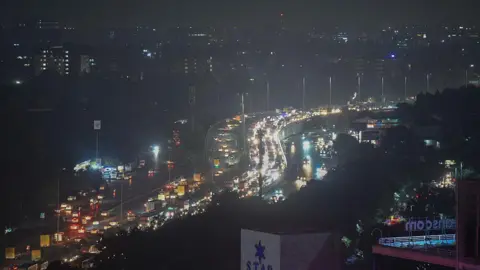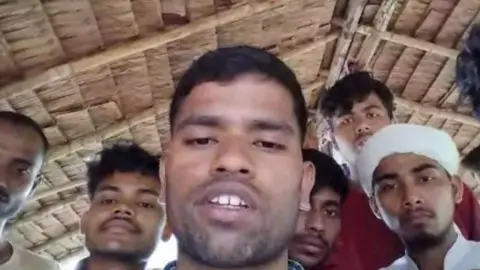In recent weeks, the Election Commission of India (ECI), renowned for its integrity, is undergoing a significant credibility crisis. Allegations ranging from voter fraud to inconsistencies in electoral rolls have emerged from various opposition parties, all of which the ECI has vehemently denied.
The opposition, emboldened by these claims, has organized massive protests and is considering an impeachment motion to remove Chief Election Commissioner Gyanesh Kumar, although it has not yet found sufficient parliamentary support to proceed. In a notable escalation of dissent, Rahul Gandhi, the leader of the Congress party, launched a 1,300km (807 miles) "Voter Adhikar Yatra" (Voter Rights March) through Bihar, a state pivotal for the upcoming elections.
Gandhi has accused the ECI of collaborating with the ruling Bharatiya Janata Party (BJP) to manipulate the upcoming 2024 general elections, alleging that the voter rolls contain over 100,000 fraudulent entries in Karnataka alone, including duplicates and invalid registrations. However, the ECI has dismissed these claims as "false and misleading," and the BJP has characterized the opposition's allegations as unfounded, claiming they are merely attempts to prepare for anticipated electoral losses.
The controversy intensified following a recent Special Intensive Revision (SIR) conducted by the ECI, where they reported updating voter rolls for the first time in over two decades. Opposition leaders claim that this hurried process has disenfranchised many, especially migrants, due to increased documentation requirements. Subsequent reports, including those from the BBC, indicated errors in the updated voter lists, including misassigned information and dead voters still on the rolls.
The new draft lists showed a decrease of 6.5 million names, which the ECI attributed to a cleansing of duplicates and deceased voters, yet many are skeptical of the motivations behind these changes. The ECI's failure to publish the excised names in a machine-readable format raised further questions about transparency, leading India’s top court to mandate better reporting practices.
In an attempt to address the growing concerns, the ECI held a weekend press conference. Chief Election Commissioner Kumar defended the institution against allegations, stating that accusations like "vote theft" insult the constitution. This rhetoric has only heightened tensions, with opposition figures stating Kumar's responses lacked substance and appropriateness.
Experts contend that while ongoing allegations and issues with voter rolls may raise red flags, they do not inherently prove wrongdoing by the ECI. Former chief election commissioner N Gopalaswami pointed out that significant removals of names can occur legitimately during revisions without indicating fraud.
The upcoming Bihar elections could see heightened scrutiny of the ECI, with the opposition ready to leverage the ongoing tensions. Observers indicate that public confidence in the ECI is showing signs of decline, a trend that experts like SY Quraishi note is essential to address. A recent survey by Lokniti revealed a stark uptick in mistrust towards the ECI since 2019, urging that this trend poses a considerable concern for the democratic process.
In this politically charged environment, the path forward for the ECI remains uncertain, as it grapples with maintaining credibility amidst escalating conflicts and public skepticism.
The opposition, emboldened by these claims, has organized massive protests and is considering an impeachment motion to remove Chief Election Commissioner Gyanesh Kumar, although it has not yet found sufficient parliamentary support to proceed. In a notable escalation of dissent, Rahul Gandhi, the leader of the Congress party, launched a 1,300km (807 miles) "Voter Adhikar Yatra" (Voter Rights March) through Bihar, a state pivotal for the upcoming elections.
Gandhi has accused the ECI of collaborating with the ruling Bharatiya Janata Party (BJP) to manipulate the upcoming 2024 general elections, alleging that the voter rolls contain over 100,000 fraudulent entries in Karnataka alone, including duplicates and invalid registrations. However, the ECI has dismissed these claims as "false and misleading," and the BJP has characterized the opposition's allegations as unfounded, claiming they are merely attempts to prepare for anticipated electoral losses.
The controversy intensified following a recent Special Intensive Revision (SIR) conducted by the ECI, where they reported updating voter rolls for the first time in over two decades. Opposition leaders claim that this hurried process has disenfranchised many, especially migrants, due to increased documentation requirements. Subsequent reports, including those from the BBC, indicated errors in the updated voter lists, including misassigned information and dead voters still on the rolls.
The new draft lists showed a decrease of 6.5 million names, which the ECI attributed to a cleansing of duplicates and deceased voters, yet many are skeptical of the motivations behind these changes. The ECI's failure to publish the excised names in a machine-readable format raised further questions about transparency, leading India’s top court to mandate better reporting practices.
In an attempt to address the growing concerns, the ECI held a weekend press conference. Chief Election Commissioner Kumar defended the institution against allegations, stating that accusations like "vote theft" insult the constitution. This rhetoric has only heightened tensions, with opposition figures stating Kumar's responses lacked substance and appropriateness.
Experts contend that while ongoing allegations and issues with voter rolls may raise red flags, they do not inherently prove wrongdoing by the ECI. Former chief election commissioner N Gopalaswami pointed out that significant removals of names can occur legitimately during revisions without indicating fraud.
The upcoming Bihar elections could see heightened scrutiny of the ECI, with the opposition ready to leverage the ongoing tensions. Observers indicate that public confidence in the ECI is showing signs of decline, a trend that experts like SY Quraishi note is essential to address. A recent survey by Lokniti revealed a stark uptick in mistrust towards the ECI since 2019, urging that this trend poses a considerable concern for the democratic process.
In this politically charged environment, the path forward for the ECI remains uncertain, as it grapples with maintaining credibility amidst escalating conflicts and public skepticism.






















